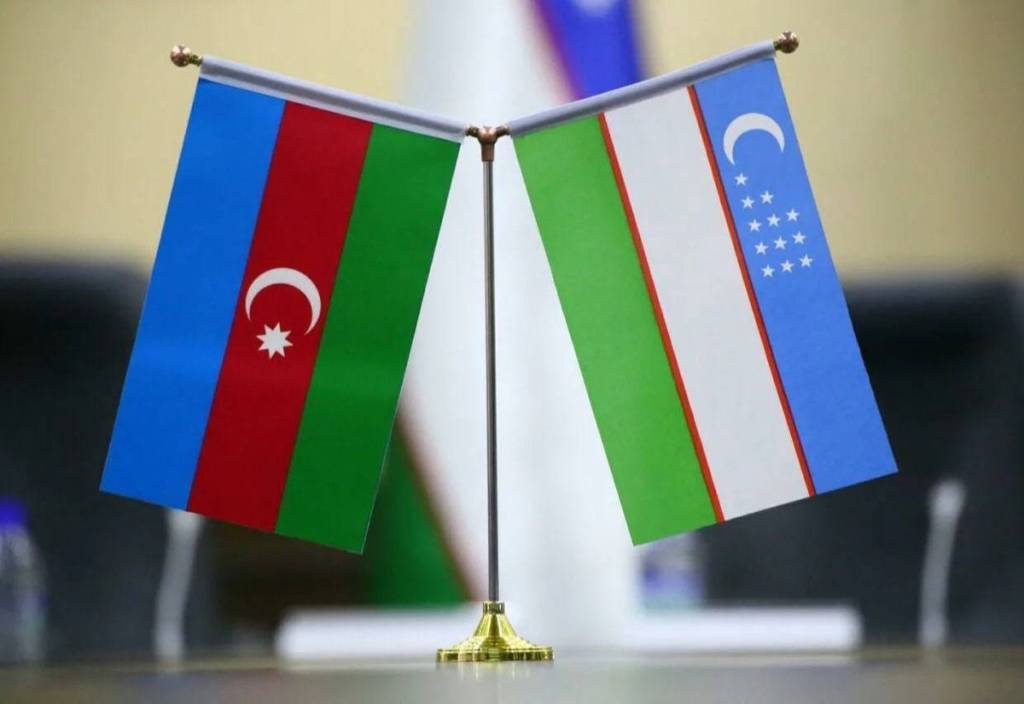
A shared Turkic heritage has brought Uzbekistan and Azerbaijan closer together for centuries: the poetry of Navoi and Fuzuli resonates in both languages, and the traditional Days of Culture in each country serve as a reminder of the deep spiritual kinship between the two peoples.
Since establishing diplomatic relations in 1995, Uzbekistan and Azerbaijan have progressed to the signing and ratification of the Treaty on Allied Relations, which has elevated the partnership between the two brotherly nations to the highest legally recognized level. Signed on August 23, 2024, in Tashkent and ratified by Presidential Decree of the Republic of Uzbekistan on May 19, 2025, this document outlines cooperation across 20 key areas.
Diplomatic Foundation of Cooperation
Diplomatic relations between the Republic of Uzbekistan and the Republic of Azerbaijan were established on October 2, 1995. By 1997-1998, embassies had been opened in Tashkent and Baku, providing a solid foundation for political dialogue and the development of humanitarian ties.
Over the past quarter-century, the two sides have signed more than fifty agreements and established mechanisms for regular intergovernmental and interparliamentary cooperation.
On August 23, 2024, Presidents Shavkat Mirziyoyev and Ilham Aliyev signed the Treaty on Allied Relations in Tashkent. The document formalized the transition from a strategic partnership to a full-fledged alliance, emphasizing key priorities such as independence, sovereignty, territorial integrity, and the sustainable development of both states.
The President of Uzbekistan signed the ratification law on May 19 this year.
Goals and Principles of the Alliance:
- Coordination across 20 areas – from the economy and high technology to green energy and cultural exchanges;
- Rejection of hostile blocs and a commitment not to support alliances that could harm bilateral relations;
- A joint foreign policy approach on key international issues, including mutual support within the United Nations and the Organization of Turkic States.
Leaders’ Remarks
“Today, we have officially become allies. This is truly, and I fully agree, a historic moment. The Treaty on Allied Relations is the highest-level international document that two countries can sign. And today in Tashkent, we are not just writing a new chapter, but a whole new book in the history of our relations. I believe the souls of our ancestors, who, I am certain, watch over us, will rejoice and bless this moment. Today, two brotherly nations, two independent, strong, sovereign, and dignified states, have officially become allies. This is a most significant step in foreign policy, one that will shape not only our bilateral relations but also regional politics for years to come”, emphasized the President of Uzbekistan Shavkat Mirziyoyev during a joint press conference in Tashkent.
“This is a most important step in foreign policy, one that will shape our relations and, to a great extent, regional politics for many years to come. Today, the regions of Central Asia, the South Caucasus, and the Caspian are forming into a single geopolitical space, and the positive developments in our regions largely depend on effective cooperation between Uzbekistan and Azerbaijan”, stated the President of Azerbaijan Ilham Aliyev.
These remarks reflect the shared political will of Tashkent and Baku to strengthen their partnership and jointly shape a constructive agenda in Central Asia and the South Caucasus.
Trade and Economic Partnership
Over the past two years, economic ties between Uzbekistan and Azerbaijan have undergone a significant growth trajectory. In 2024, total trade turnover exceeded $252 million, representing a 41 percent increase from 2023.
Speaking at the 3rd Azerbaijan – Uzbekistan Interregional Forum, the Minister of Economy of Azerbaijan Mikayil Jabbarov noted that in the current year, bilateral trade volume has already surpassed $200 million, approximately three times higher than during the same period last year. An ambitious target has been set: to increase this figure to $1 billion by 2030.
Uzbekistan’s exports are currently led by smoking tobacco, copper wire, car bodies, and internal combustion engines. Azerbaijan, in turn, supplies Uzbekistan with aluminum alloys, apples, and hazelnuts. An active search for new product categories, including chemicals and food ingredients, is strengthening this trade structure.
Logistics plays a significant role in economic cooperation. Azerbaijan provides Uzbekistan with the shortest land-sea route to European markets via the Trans-Caspian International Transport Corridor and the Baku – Tbilisi – Kars railway, whose annual throughput has already reached five million tons. According to the roadmap, the Ministry of Transport of Uzbekistan plans to increase the volume of export-import transit through Azerbaijani infrastructure to 1.5 million tons per year and to establish its own terminal at the Port of Alat.
Investment and Industrial Cooperation
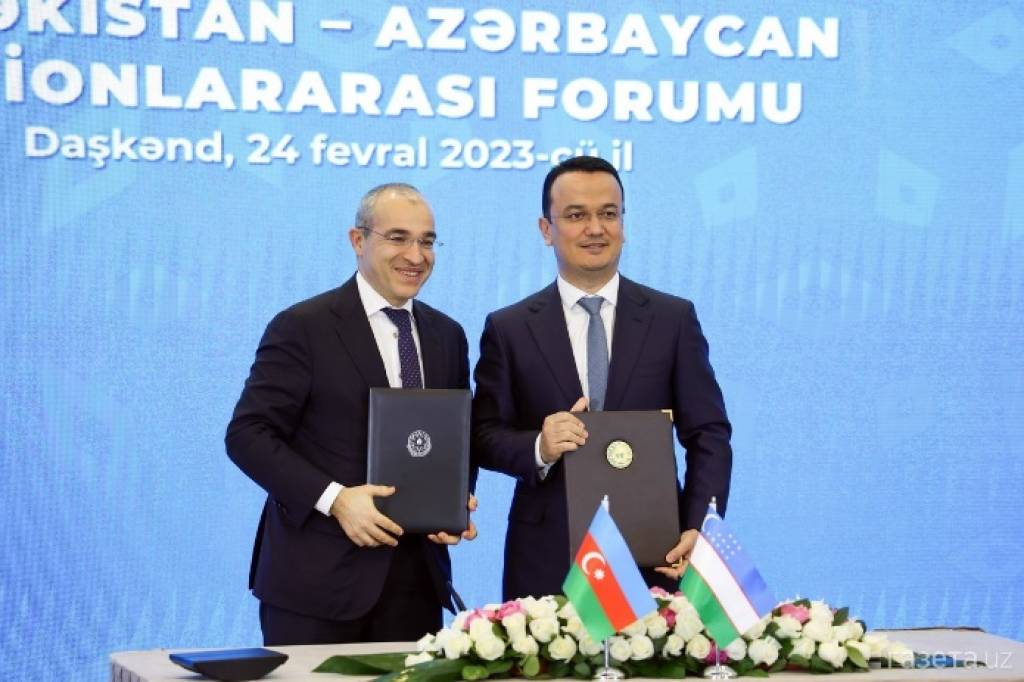
The Azerbaijan – Uzbekistan Investment Fund, established in 2023 with a charter capital of $500 million, has laid the groundwork for major joint projects. More than 100 initiatives are currently under consideration, with 15 undergoing in-depth evaluation. Additionally, six projects, worth over $80 million in total, have already been approved. The portfolio includes four industrial projects, a fintech startup, and the construction of an international school in New Tashkent.
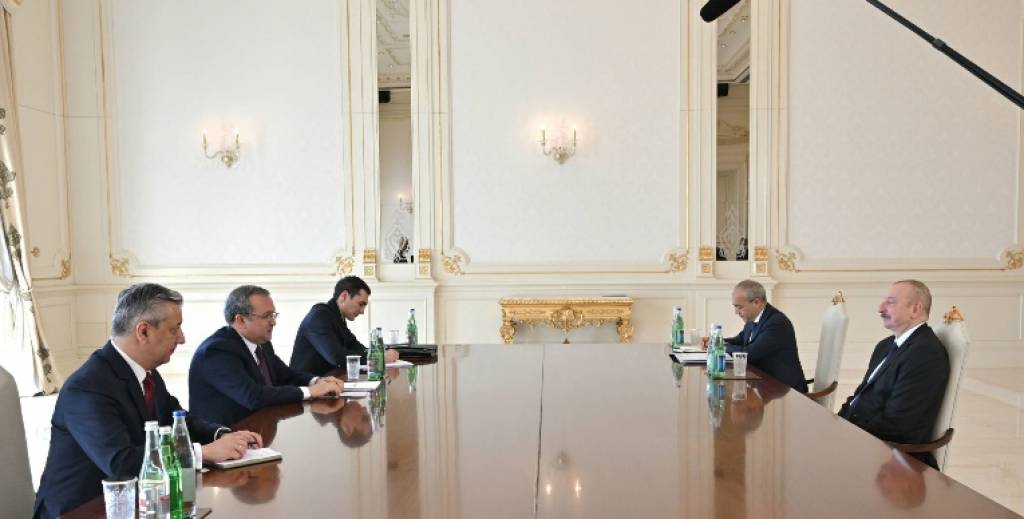
A key industrial driver remains the automotive cluster in the Hajigabul Industrial Park. Since 2021, UzAuto Motors and Azermash have been jointly producing five Chevrolet models at the facility. By the end of 2023, approximately 8,900 vehicles had rolled off the assembly line. In 2024, construction began on a second plant with an annual production capacity of 30,000 cars.
An equally significant symbol of the new level of partnership is the joint textile factory in Khankendi, inaugurated on November 13, 2024, with the participation of the heads of state. The enterprise has created 300 jobs, with plans to expand the workforce to 800 employees. This year, the factory is set to produce 924,000 T-shirts, 80% of which are intended for export.
As for new areas of cooperation, the two sides are discussing joint cotton cultivation and the advanced processing of fruit and vegetable products using Uzbek agricultural technologies.
Air Transport
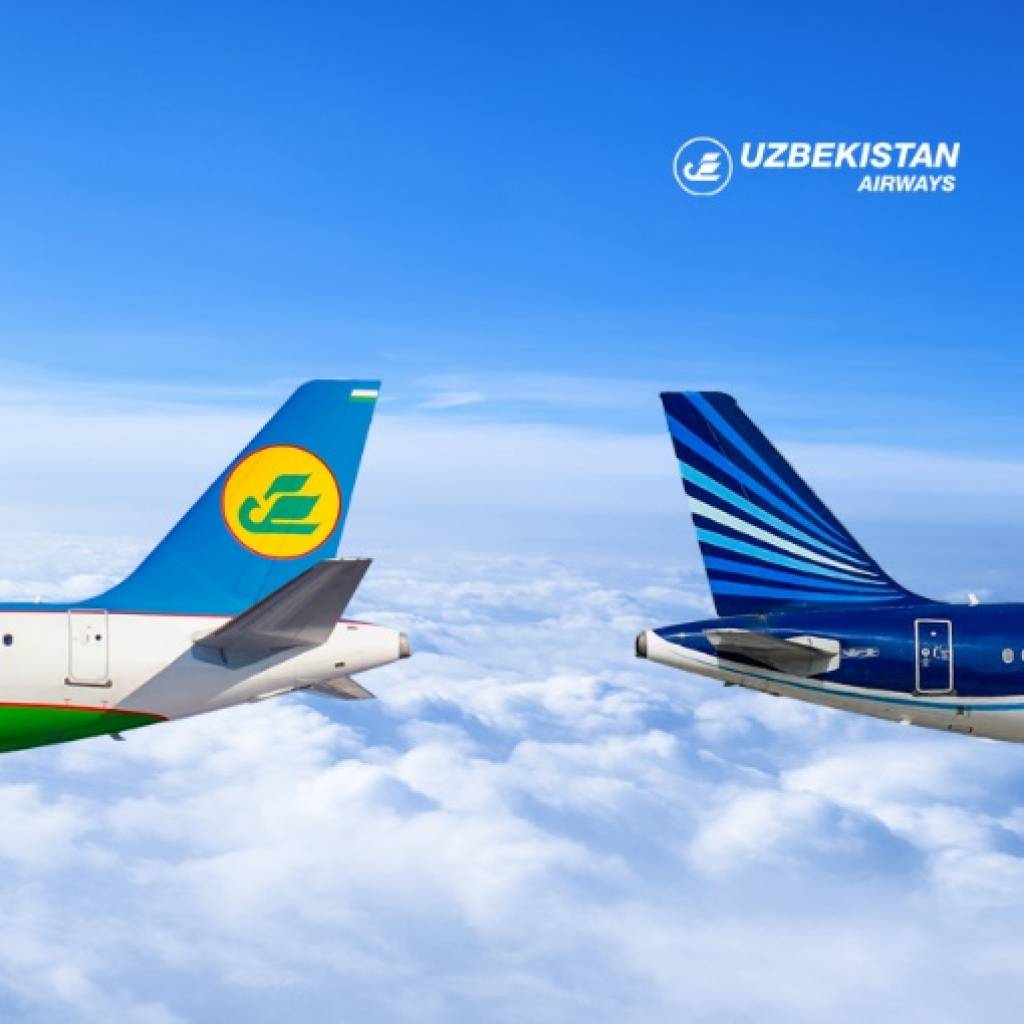
The heads of state agreed to increase flight frequency and launch direct routes between Baku and Samarkand, Baku and Fergana, and Baku and Urgench. These routes will enhance tourism and business exchanges between the regions of both countries. A codeshare agreement between AZAL and Uzbekistan Airways is already in effect, providing up to nine weekly flights on the Baku – Tashkent route, as well as connecting flights to Samarkand.
Energy and Green Transformation
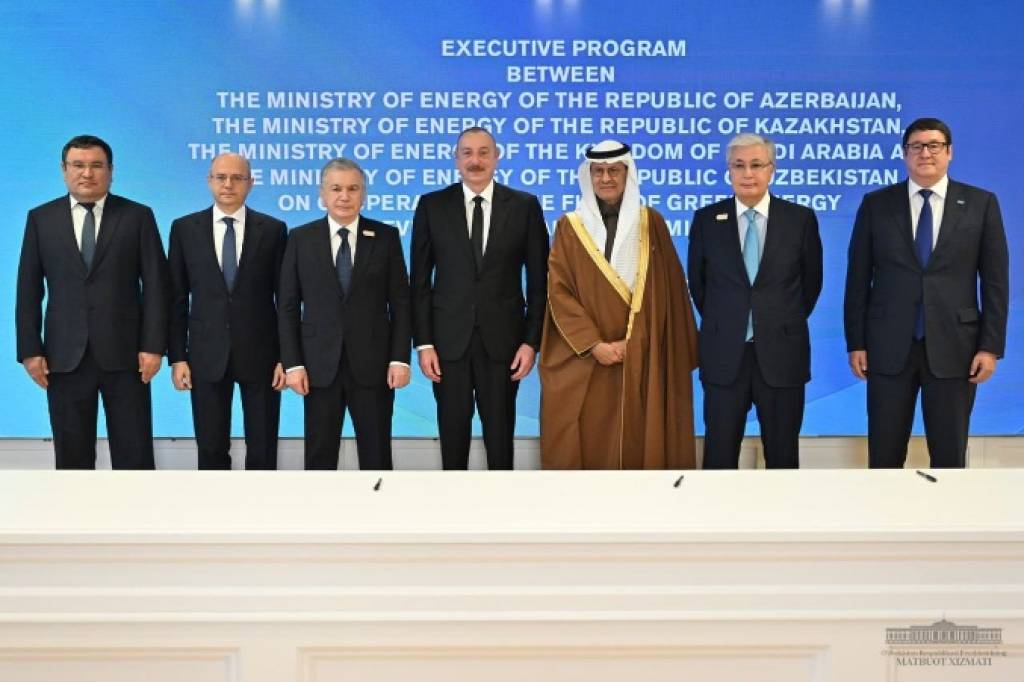
At the COP29 climate summit on November 13, 2024, Uzbekistan, Kazakhstan, and Azerbaijan signed a strategic partnership agreement on the production and transmission of clean energy, affirming their joint commitment to exporting green electricity to Europe.
The agreement includes the construction of a submarine cable stretching more than 2,500 km along the Caspian Sea floor, with a connection through the Black Sea to European networks. This infrastructure will enable the annual delivery of up to 4 GW of renewable energy. Azerbaijan will act as a key transit hub, integrating power transmission lines and providing access to its energy exchange infrastructure.
Uzbekistan’s National Goals
The country’s energy strategy sets a target of increasing the share of renewable energy sources to 40% by 2030. To balance daily fluctuations in power generation, Uzbekistan plans to introduce 4.2 GW of energy storage systems. These goals are supported by the launch of solar and wind power parks with a combined capacity of 8 GW, as well as the establishment of green hydrogen production clusters.
Azerbaijan’s Role
Baku serves as a strategic transport link between Central Asia and the European energy grid. Its high-voltage transmission corridors, the Port of Alat, and the planned undersea cable position Azerbaijan as a key transit hub for the export of Uzbekistan’s electricity.
Joint Initiatives in International Organizations
Uzbekistan and Azerbaijan are steadily advancing shared priorities within the Organization of Turkic States (OTS), the Commonwealth of Independent States (CIS), and the Non-Aligned Movement.
At the informal OTS summit in Shusha on July 6, 2024, the leaders signed the Karabakh Declaration, focusing on transport, connectivity, and climate agendas. Uzbekistan endorsed all provisions of the declaration and proposed establishing a working group on green trade corridors within the OTS. Within the CIS framework, Tashkent and Baku coordinate their positions on the digitalization of cross-border trade procedures. The experience gained during Uzbekistan’s chairmanship of the CIS in 2020 in strengthening the transport and logistics sector is being utilized by both sides in preparation for the 2025 Council of Heads of Government.
The two countries are also intensifying their activity in the Non-Aligned Movement: Baku continues its chairmanship until the end of this year, while Uzbekistan has publicly expressed its intention to lead the Movement from 2027 to 2029, emphasizing its commitment to contributing to the sustainable development of member states.
Strategic “Bridges”
The partners complement each other’s geoeconomic ambitions: Uzbekistan serves as a “gateway” for Azerbaijani business into the markets of Central Asia and Afghanistan. At the same time, Azerbaijan offers the shortest route for Uzbek goods and electricity to reach Europe. This reduces both countries’ dependence on congested traditional corridors and strengthens their bargaining positions on Eurasian energy and transport platforms.
Amid growing turbulence in the global economy, the alliance between Tashkent and Baku provides an additional “anchor of stability”. Joint projects in renewable energy, logistics, and defense cooperation, such as the 2024 interagency action plan, demonstrate their capacity to swiftly adapt to emerging risks and uphold a balanced alignment of interests across Eurasia.
The evolving allied model, based on the synergistic combination of economic, energy, transport, and cultural-humanitarian projects, reaffirms the shared political will of the two countries’ leaders to elevate bilateral cooperation to the highest level of trust and mutual benefit.
According to expert forecasts, over the next five years, both sides are expected to institutionalize the agreements reached in the form of new sector-specific roadmaps, deepen coordination within the Organization of Turkic States and the Non-Aligned Movement, and launch additional joint initiatives. These measures will contribute to the sustainable development of Central Asia and the South Caucasus.
Abduaziz Khidirov, UzA








